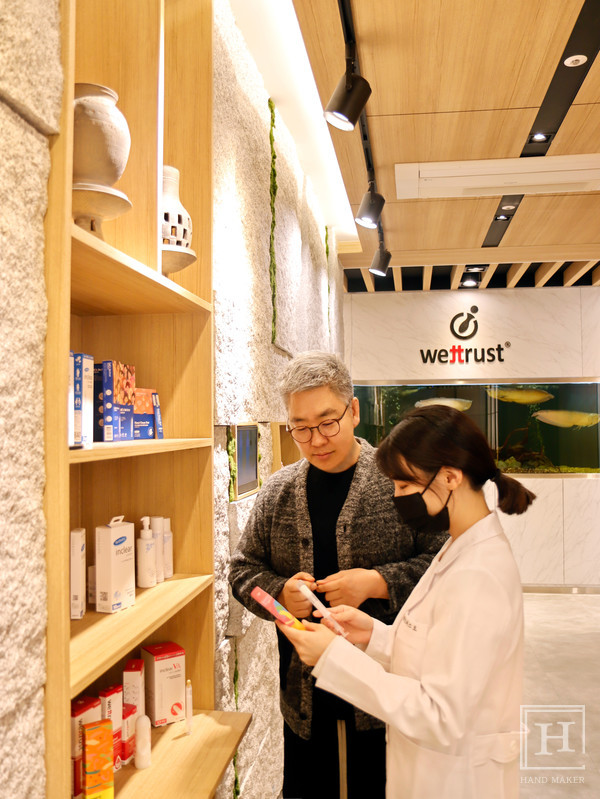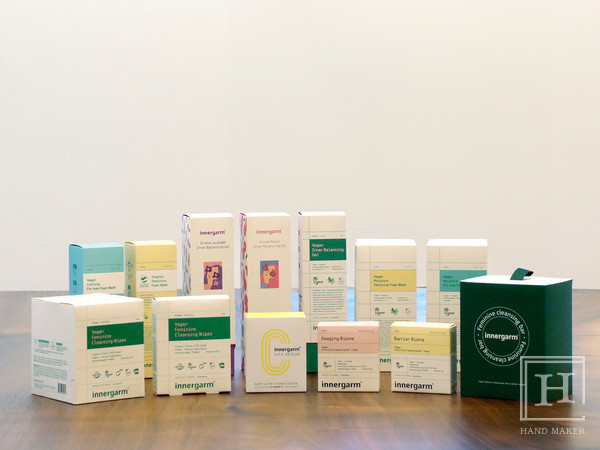NEWS
관리자
2024.09.06
innergarm(Korea)
Inner Beauty Is Also Crucial for Women’s Physical and Mental Health Throughout Their Lifespan – Wettrust CEO Bang Ji-Hwan
Visiting the hospital when feeling unwell is a normal part of life. However, among various medical departments, obstetrics and gynecology remain particularly difficult for women to approach. In fact, only 3 out of 10 women visit an OB-GYN when experiencing related symptoms—an unfortunate statistic.
Wettrust CEO Bang Ji-Hwan also felt disheartened by this societal perception, which motivated him to begin developing feminine care products. “Women go through physical and emotional changes throughout life—from menstruation, pregnancy, and childbirth to menopause. That’s why it’s important to use feminine care products tailored to each life stage,” he emphasized.
Bang has grown Wettrust into a trusted brand by applying his expertise and business philosophy to the research and development of feminine care products. In our interview, he shared how he started the business and the journey that followed.
What led you to start this business?
There was a time when I lived in Japan. Back then, I noticed how much Japanese society valued women’s health. Newspapers even featured articles on vaginal dryness. It was the early 2000s, and in Korea, there was virtually no discussion of such topics. The contrast was striking, and it sparked my interest in feminine care products. This eventually led to launching the business in both Japan and Korea.
The beginning wasn’t easy. Feminine care products aren’t like regular cosmetics or beauty items—they require specialized facilities, design patents, and intellectual property rights. After continuous development, we launched related products under the brands innergarm and inclear.
What’s the story behind the brands and what makes them different?
Unlike men, women are more susceptible to various conditions, yet products addressing those needs were nearly nonexistent at the time. That made me even more determined to develop feminine care products. Today, our feminine cleansers are not only recognized in Korea but have also been registered as medical devices in Japan and with the U.S. FDA, demonstrating their reliability.
One key differentiator is that we were the first to introduce a syringe-type feminine cleanser. It was a pioneering move—back when even the term “feminine cleanser” wasn’t commonly known in the market.
Another unique feature is that our products are vegan-certified, meaning they do not contain animal-derived ingredients and are not tested on animals. Creating vegan-certified products in a world where common chemical ingredients have long been tested and stabilized was a challenge. But I believed it was necessary to deliver safer and more meaningful products to consumers.
Who would you recommend your products to?
Rather than targeting a specific group, we hope our products can be used by anyone who needs them. Our feminine cleansers, foam washes, and cleansing bars are developed based on the different stages of a woman’s life. Our ultimate goal is to contribute to reducing health risks that can arise when women’s well-being is compromised.
What are your plans for expanding into overseas markets?
We believe it’s important to promote our technology globally, which is why we’re actively focusing on overseas markets. We regularly participate in international exhibitions and carry out marketing efforts. While obtaining certifications for each country can be challenging, our partners provide great support.
In Japan, our products have gained such popularity that they’ve earned the nickname “national feminine cleanser.” Our products are now available in about 25,000 drugstores and variety shops, accounting for roughly 80% of total market entry. In China, many of our products have received regulatory approvals, and we’re also expanding into Taiwan, Vietnam, Thailand, and Indonesia.
With Asia fairly well established, we’re now turning our attention to the U.S. and European markets. Last year, we established a U.S. subsidiary and are working to maintain strict quality control as we expand.
What are your goals for the second half of this year and next year?
I believe it’s essential to define a clear direction with our team and develop product lineups that fit each distribution channel. For example, we’re considering which types of retail channels are best suited for our vegan products, and how to strategically grow them within those spaces.
What does the future of Wettrust look like?
Women experience a range of physiological changes across their lifespan—from menstruation to menopause and beyond. Our goal is to develop products that are tailored to each of these life stages. We want to create healthcare products that support not just physical health, but also serve a preventive medical function. After all, managing physical well-being can also help address mental health challenges like stress and depression.
We believe now is a time of generational change. It’s been over 20 years since we began developing feminine care products, and Wettrust continues to hold a unique position in the industry. However, there’s still a lack of specialized professionals in this field in Korea. That’s why we are putting our efforts into R&D and nurturing talent in the feminine care sector. Through this, we aim to grow into a leading company in the field of feminine care.


